
"Jumpin' Jack Flash" is a song by the English rock band the Rolling Stones, released as a non-album single in 1968. Called "supernatural Delta blues by way of Swinging London" by Rolling Stone magazine, the song was perceived by some as the band's return to their blues roots after the baroque pop and psychedelia heard on their preceding albums Aftermath (1966), Between the Buttons (1967) and especially Their Satanic Majesties Request (1967). One of the group's most popular and recognisable songs, it has been featured in films and covered by numerous performers, notably Thelma Houston, Aretha Franklin, Tina Turner, Peter Frampton, Johnny Winter, Leon Russell and Alex Chilton. To date, it is the band's most-performed song; they have played it over 1,100 times in concert.

Forty Licks is a double compilation album by the Rolling Stones. A 40-year career-spanning retrospective, Forty Licks is notable for being the first retrospective to combine their formative Decca/London era of the 1960s, now licensed by ABKCO Records, with their self-owned post-1970 material, distributed at the time by Virgin/EMI but now distributed by ABKCO's own distributor Universal Music Group. Four new songs are included on the second disc. The album was a commercial success, as it reached No. 2 on both UK and US charts. Concurrently with the album's release, the Stones embarked on the successful, year-long international Licks Tour, which would result in the subsequent Live Licks album being released in 2004.

Live Licks is a 2004 double CD by The Rolling Stones, their ninth official live album. Coming six years after No Security, it features performances from the 2002–2003 Licks Tour in support of the career-spanning, fortieth anniversary retrospective Forty Licks. The album includes "an entire side of songs never before recorded live", and features only one song recorded after 1981's Tattoo You.
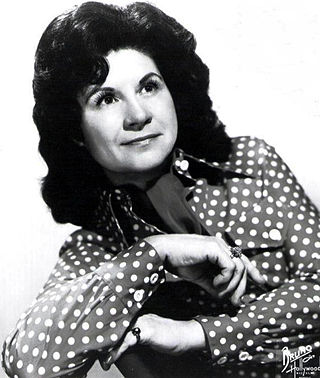
Ellen Muriel Deason, known professionally as Kitty Wells, was an American pioneering female country music singer. She broke down a barrier for women in country music with her 1952 hit recording "It Wasn't God Who Made Honky Tonk Angels", which also made her the first female country singer to top the U.S. country charts and turned her into the first female country superstar. “It Wasn’t God Who Made Honky Tonk Angels” would also be her first of several pop crossover hits. Wells is the only artist to be awarded top female vocalist awards for 14 consecutive years. Her chart-topping hits continued until the mid-1960s, paving the way for and inspiring a long list of female country singers who came to prominence in the 1960s.

"Ruby Tuesday" is a song recorded by the Rolling Stones in 1966, released in January 1967. The song became the band's fourth number-one hit in the United States and reached number three in the United Kingdom as a double A-side with "Let's Spend the Night Together". The song was included in the American version of Between the Buttons.
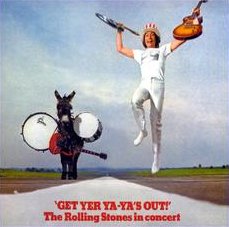
Get Yer Ya-Ya's Out!: The Rolling Stones in Concert is the second live album by the Rolling Stones, released on 4 September 1970 on Decca Records in the UK and on London Records in the United States. It was recorded in New York City and Baltimore in November 1969 prior to the release of Let It Bleed. It is the first live album to reach number 1 in the UK. It was reported to have been issued in response to the well-known bootleg Live'r Than You'll Ever Be. This was also the band's final release under the Decca record label and not under its own label Rolling Stones Records.

Made in the Shade, released in 1975, is the third official compilation album by the Rolling Stones, and the first under their Atlantic Records contract. It covers material from Sticky Fingers (1971), Exile on Main St. (1972), Goats Head Soup (1973) and It's Only Rock 'n' Roll (1974).

"Honky Tonk Women" is a song by the English rock band the Rolling Stones. It was released as a non-album single on 4 July 1969 in the United Kingdom, and a week later in the United States. It topped the charts in both nations. The song was on Rolling Stone's 500 Greatest Songs of All Time list, and was inducted into the Grammy Hall of Fame.

Stripped is a live album by the English rock band The Rolling Stones released in November 1995 after the Voodoo Lounge Tour. It contains six live tracks and eight studio recordings. The live tracks were taken from four 1995 performances, at three small venues, and include a cover of Bob Dylan's "Like a Rolling Stone", which was the first single from the album. The remaining eight tracks were acoustic studio re-recordings of songs from the Stones' previous catalogue, the exception being a cover of Willie Dixon's "Little Baby". The studio performances were recorded "live," i.e., without overdubs.

Singles Collection: The London Years is a compilation album by the Rolling Stones, released in 1989. It was released as a 3-CD and a 4-LP set.

Big Hits (High Tide and Green Grass) is the first compilation album by the Rolling Stones. With different cover art and track listings, it was released on 28 March 1966, on London Records in the US and on 4 November 1966, by Decca Records in the UK.

"Let's Spend the Night Together" is a song written by Mick Jagger and Keith Richards, and originally released by the Rolling Stones as a double A-sided single together with "Ruby Tuesday" in January 1967. It also appears as the opening track on the American version of their album Between the Buttons. The song has been covered by various artists, including David Bowie in 1973.

"She's a Rainbow" is a song by the Rolling Stones and was featured on their 1967 album Their Satanic Majesties Request. It has been called "the prettiest and most uncharacteristic song" that Mick Jagger and Keith Richards wrote for the Stones, although somewhat ambiguous in intention.

"Dandelion" is a song by the English rock band the Rolling Stones, written by Mick Jagger and Keith Richards, and first released as a B-side to "We Love You" in August 1967. As recently as October 2023 Keith Richards confirmed that John Lennon and Paul McCartney sing backing vocals. Billboard described the single as "an easy beat rocker with good story line."

Honky Tonk Angels is a collaborative studio album by Dolly Parton, Loretta Lynn and Tammy Wynette. It was released on November 2, 1993, by Columbia Records. The album was certified Gold by the RIAA on January 5, 1994, for sales of 500,000 copies.
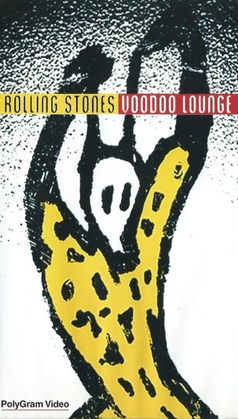
Voodoo Lounge Live is a concert video by the rock band the Rolling Stones. It was filmed on 25 November 1994 at Joe Robbie Stadium in Miami Gardens, Florida during the Voodoo Lounge Tour. The concert was broadcast as a pay-per-view special.
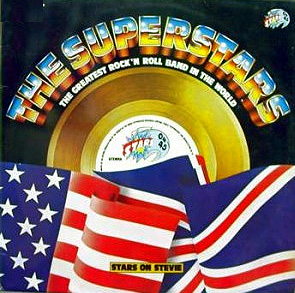
The Superstars is the third album by the Dutch soundalike studio group Stars on 45, released on the CNR Records label in the Netherlands in March 1982. In the US, the album was retitled Stars On Long Play III, released on Radio Records and credited to 'Stars On'. In the UK, Ireland, Australia and New Zealand, the album was instead titled Stars Medley, again credited to Starsound and released by CBS Records. Just like the first Stars on 45 album The Superstars was also issued in the Soviet Union and large parts of the Eastern Bloc by the state-owned label Melodiya, credited to Stars on 45 but released under the title Discotheque Stars 2.
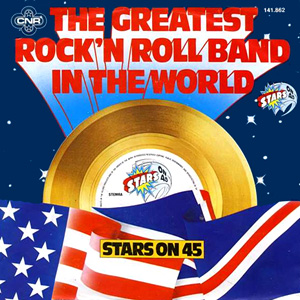
"The Greatest Rock 'n Roll Band in the World" a.k.a. "Stars Medley" a.k.a. "Stars on 45 III: Rollin' Stars" is a song issued in 1982 by the Dutch studio group Stars on 45, in the UK credited to 'Starsound', in the US 'Stars On'. It was the second single from the band's third full-length release The Superstars.

América Latina Olé was a concert tour by The Rolling Stones, which began on 3 February 2016 in Santiago and made stops in La Plata, Montevideo, Rio de Janeiro, São Paulo, Porto Alegre, Lima, Bogotá, Mexico City and ended in Havana with a free show on 25 March 2016. The tour was chronicled on two video releases: The Rolling Stones: Havana Moon, which documented the final show, and Olé Olé Olé!: A Trip Across Latin America, a documentary following the band across the continent.

The Rolling Stones in Mono is a box set by the English rock band the Rolling Stones, released by ABKCO Records in September 2016. It contains most of the group's British and American studio albums from the 1960s in mono format, on fifteen compact discs or sixteen vinyl records. All tracks were remastered using the Direct Stream Digital process by Bob Ludwig. The original recordings were produced by Andrew Loog Oldham, Jimmy Miller and the Rolling Stones.




















